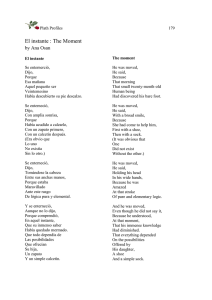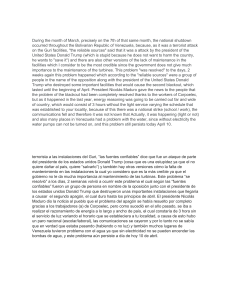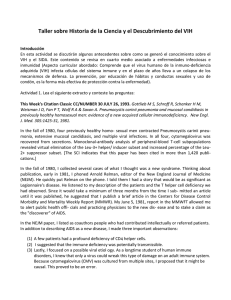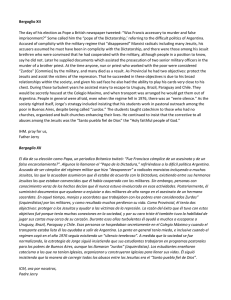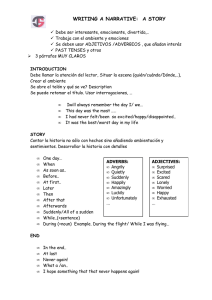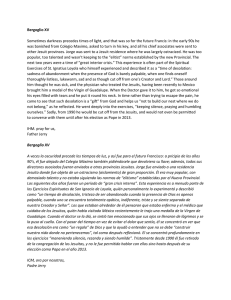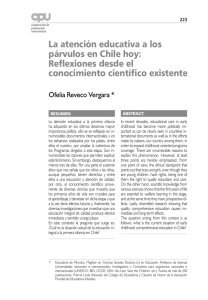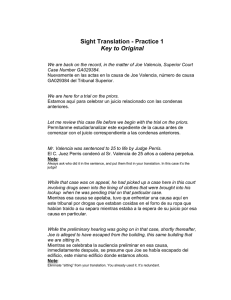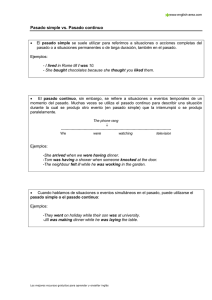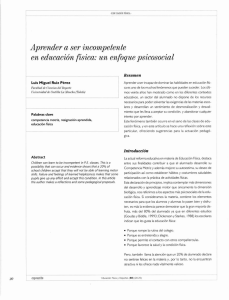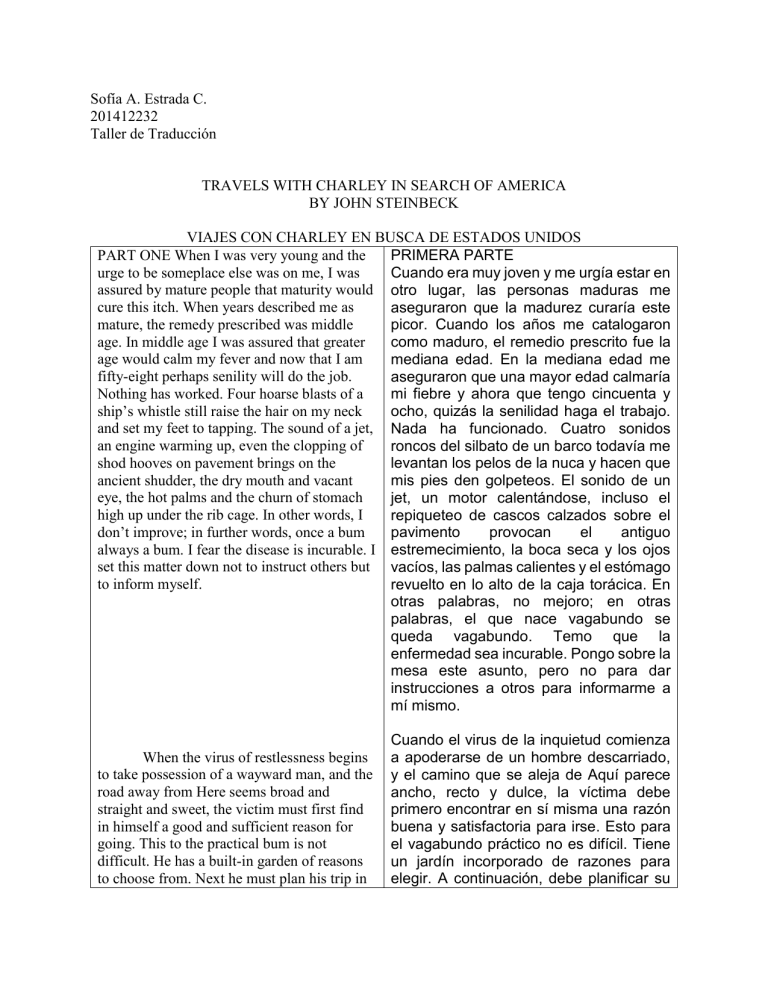
Sofía A. Estrada C. 201412232 Taller de Traducción TRAVELS WITH CHARLEY IN SEARCH OF AMERICA BY JOHN STEINBECK VIAJES CON CHARLEY EN BUSCA DE ESTADOS UNIDOS PART ONE When I was very young and the PRIMERA PARTE urge to be someplace else was on me, I was Cuando era muy joven y me urgía estar en assured by mature people that maturity would otro lugar, las personas maduras me cure this itch. When years described me as aseguraron que la madurez curaría este mature, the remedy prescribed was middle picor. Cuando los años me catalogaron age. In middle age I was assured that greater como maduro, el remedio prescrito fue la age would calm my fever and now that I am mediana edad. En la mediana edad me fifty-eight perhaps senility will do the job. aseguraron que una mayor edad calmaría Nothing has worked. Four hoarse blasts of a mi fiebre y ahora que tengo cincuenta y ship’s whistle still raise the hair on my neck ocho, quizás la senilidad haga el trabajo. and set my feet to tapping. The sound of a jet, Nada ha funcionado. Cuatro sonidos an engine warming up, even the clopping of roncos del silbato de un barco todavía me shod hooves on pavement brings on the levantan los pelos de la nuca y hacen que ancient shudder, the dry mouth and vacant mis pies den golpeteos. El sonido de un eye, the hot palms and the churn of stomach jet, un motor calentándose, incluso el high up under the rib cage. In other words, I repiqueteo de cascos calzados sobre el don’t improve; in further words, once a bum pavimento provocan el antiguo always a bum. I fear the disease is incurable. I estremecimiento, la boca seca y los ojos set this matter down not to instruct others but vacíos, las palmas calientes y el estómago to inform myself. revuelto en lo alto de la caja torácica. En otras palabras, no mejoro; en otras palabras, el que nace vagabundo se queda vagabundo. Temo que la enfermedad sea incurable. Pongo sobre la mesa este asunto, pero no para dar instrucciones a otros para informarme a mí mismo. When the virus of restlessness begins to take possession of a wayward man, and the road away from Here seems broad and straight and sweet, the victim must first find in himself a good and sufficient reason for going. This to the practical bum is not difficult. He has a built-in garden of reasons to choose from. Next he must plan his trip in Cuando el virus de la inquietud comienza a apoderarse de un hombre descarriado, y el camino que se aleja de Aquí parece ancho, recto y dulce, la víctima debe primero encontrar en sí misma una razón buena y satisfactoria para irse. Esto para el vagabundo práctico no es difícil. Tiene un jardín incorporado de razones para elegir. A continuación, debe planificar su time and space, choose a direction and a destination. And last he must implement the journey. How to go, what to take, how long to stay. This part of the process is invariable and immortal. I set it down only so that newcomers to bumdom, like teen-agers in new-hatched sin, will not think they invented it. Once a journey is designed, equipped, and put in process, a new factor enters and takes over. A trip, a safari, an exploration, is an entity, different from all other journeys. It has personality, temperament, individuality, uniqueness. A journey is a person in itself; no two are alike. And all plans, safeguards, policing, and coercion are fruitless. We find after years of struggle that we do not take a trip; a trip takes us. Tour masters, schedules, reservations, brass-bound and inevitable, dash themselves to wreckage on the personality of the trip. Only when this is recognized can the blown-in-the-glass bum relax and go along with it. Only then do the frustrations fall away. In this a journey is like marriage. The certain way to be wrong is to think you control it. I feel better now, having said this, although only those who have experienced it will understand it. viaje en el tiempo y el espacio, elegir una dirección y un destino. Y por último debe implementar el viaje. Cómo ir, qué llevar, cuánto tiempo quedarse. Esta parte del proceso es invariable e inmortal. Lo pongo sobre la mesa solo para que los recién llegan al vagabundeo, como los adolescentes en el pecado recién nacido, no crean que lo inventaron. Una vez que un viaje está diseñado, equipado y puesto en proceso, un nuevo factor entra y se hace cargo. Un viaje, un safari, una exploración, es una entidad, diferente a todos los demás viajes. Tiene personalidad, temperamento, individualidad, singularidad. Un viaje es una persona en sí mismo; no hay dos iguales. Y todos los planes, salvaguardias, vigilancia y coacción son infructuosos. Descubrimos después de años de lucha que no hacemos un viaje; nos lleva un viaje. Maestros de la gira, horarios, reservaciones, encuadernados e inevitables, se lanzan a la ruina de la personalidad del viaje. Solo cuando se reconoce esto, el vagabundo genuino puede relajarse y aceptarlo. Sólo entonces desaparecen las frustraciones. En esto, un viaje es como un matrimonio. La forma segura de equivocarse es pensar que lo controlas. Ahora me siento mejor, habiendo dicho esto, aunque solo lo entenderán quienes lo hayan experimentado. Mi plan era claro, conciso y razonable, My plan was clear, concise, and creo. Durante muchos años he viajado por reasonable, I think. For many years I have muchas partes del mundo. En Estados Unidos traveled in many parts of the world. In vivo en Nueva York, o me sumerjo en Chicago America I live in New York, or dip into o San Francisco. Pero Nueva York no es más Chicago or San Francisco. But New York is América que París es Francia o Londres es no more America than Paris is France or Inglaterra. Así descubrí que no conocía mi London is England. Thus I discovered that I propio país. Yo, un escritor estadounidense, did not know my own country. I, an American que escribía sobre Estados Unidos, trabajaba writer, writing about America, was working de memoria, y la memoria es, en el mejor de from memory, and the memory is at best a los casos, una reserva defectuosa y deformada. faulty, warpy reservoir. I had not heard the No había escuchado el habla de Estad, olí la speech of America, smelled the grass and hierba y los árboles y las aguas residuales, vi trees and sewage, seen its hills and water, its color and quality of light. I knew the changes only from books and newspapers. But more than this, I had not felt the country for twentyfive years. In short, I was writing of something I did not know about, and it seems to me that in a so-called writer this is criminal. My memories were distorted by twentyfive intervening years. sus colinas y agua, su color y calidad de luz. Solo conocía los cambios por libros y periódicos. Pero más que esto, no había sentido el país durante veinticinco años. En resumen, estaba escribiendo sobre algo que no conocía y me parece que en un supuesto escritor esto es criminal. Mis recuerdos fueron distorsionados por veinticinco años intermedios. Una vez viajé en un viejo vagón de Once I traveled about in an old bakery panadería, con campanilla de dos puertas con wagon, double-doored rattler with a mattress un colchón en el suelo. Me detuve donde la on its floor. I stopped where people stopped gente se detuvo o se reunió, escuché, miré y or gathered, I listened and looked and felt, sentí y en el proceso tuve una imagen de mi and in the process had a picture of my country país cuya precisión solo se vio afectada por mis the accuracy of which was impaired only by propias deficiencias. my own shortcomings. Así fue que decidí volver a mirar, para So it was that I determined to look intentar redescubrir esta tierra de monstruos. again, to try to rediscover this monster land. De lo contrario, por escrito, no podría decir las Otherwise, in writing, I could not tell the pequeñas verdades de diagnóstico que son los small diagnostic truths which are the fundamentos de la verdad más amplia. Se foundations of the larger truth. One sharp presentó una gran dificultad. En los veinticinco difficulty presented itself. In the intervening años transcurridos, mi nombre se había hecho twenty-five years my name had become bastante conocido. Y ha sido mi experiencia reasonably well known. And it has been my que cuando la gente ha oído hablar de ti, experience that when people have heard of favorablemente o no, cambian; se convierten, you, favorably or not, they change; they a través de la timidez u otras cualidades que become, through shyness or the other qualities inspira la publicidad, en algo que no son en that publicity inspires, something they are not circunstancias normales. Siendo así, mi viaje under ordinary circumstances. This being so, exigió que dejara mi nombre y mi identidad en my trip demanded that I leave my name and casa. Tenía que ser ojos y oídos peripatéticos, my identity at home. I had to be peripatetic una especie de plato de gelatina en eyes and ears, a kind of moving gelatin plate. movimiento. No podía firmar registros de I could not sign hotel registers, meet people I hotel, conocer gente que conocía, entrevistar a knew, interview others, or even ask searching otros o incluso hacer preguntas de búsqueda. questions. Furthermore, two or more people Además, dos o más personas perturban el disturb the ecologic complex of an area. I had complejo ecológico de un área. Tenía que ir to go alone and I had to be self-contained, a solo y tenía que ser autosuficiente, una especie kind of casual turtle carrying his house on his de tortuga casual que cargaba su casa en la back. espalda. With all this in mind I wrote to the head office of a great corporation which manufactures trucks. I specified my purpose Con todo esto en mente, escribí a la oficina central de una gran corporación que fabrica camiones. Especifiqué mi propósito y mis necesidades. Quería una camioneta pick- and my needs. I wanted a threequarter-ton pick-up truck, capable of going anywhere under possibly rigorous conditions, and on this truck I wanted a little house built like the cabin of a small boat. A trailer is difficult to maneuver on mountain roads, is impossible and often illegal to park, and is subject to many restrictions. In due time, specifications came through, for a tough, fast, comfortable vehicle, mounting a camper top—a little house with double bed, a four-burner stove, a heater, refrigerator and lights operating on butane, a chemical toilet, closet space, storage space, windows screened against insects— exactly what I wanted. It was delivered in the summer to my little fishing place at Sag Harbor near the end of Long Island. Although I didn’t want to start before Labor Day, when the nation settles back to normal living, I did want to get used to my turtle shell, to equip it and learn it. It arrived in August, a beautiful thing, powerful and yet lithe. It was almost as easy to handle as a passenger car. And because my planned trip had aroused some satiric remarks among my friends, I named it Rocinante, which you will remember was the name of Don Quixote’s horse. Since I made no secret of my project, a number of controversies arose among my friends and advisers. (A projected journey spawns advisers in schools.) I was told that since my photograph was as widely distributed as my publisher could make it, I would find it impossible to move about without being recognized. Let me say in advance that in over ten thousand miles, in thirty-four states, I was not recognized even once. I believe that people identify things only in context. Even those people who might have known me against a background I am up de tres cuartos de tonelada, capaz de ir a cualquier parte bajo condiciones posiblemente rigurosas y en esta camioneta quería una casita construida como la cabina de un bote pequeño. Un remolque es difícil de maniobrar en carreteras de montaña, es imposible y a menudo ilegal estacionarse, y está sujeto a muchas restricciones. A su debido tiempo, llegaron las especificaciones para un vehículo resistente, rápido y cómodo, que montaba la parte superior de una caravana: una casita con cama doble, una estufa de cuatro quemadores, un calentador, refrigerador y luces que funcionan con butano, un inodoro químico, un armario. espacio, espacio de almacenamiento, ventanas con mosquiteros contra insectos, exactamente lo que quería. Me lo llevaron en verano a mi pequeño lugar de pesca en Sag Harbor, cerca del final de Long Island. Aunque no quería empezar antes del Día del Trabajo, cuando la nación vuelva a la vida normal, quería acostumbrarme a mi caparazón de tortuga, equiparlo y aprenderlo. Llegó en agosto, algo hermoso, poderoso pero ágil. Era casi tan fácil de manejar como un automóvil de pasajeros. Y como el viaje que había planeado había suscitado algunos comentarios satíricos entre mis amigos, lo llamé Rocinante, que recordarán, era el nombre del caballo de Don Quijote. Como no oculté mi proyecto, surgieron una serie de controversias entre mis amigos y asesores. (Un viaje proyectado genera asesores en las escuelas). Me dijeron que, dado que mi fotografía estaba tan ampliamente distribuida como podía hacerlo mi editor, me resultaría imposible moverme sin ser reconocido. Permítanme decirles de antemano que en más de diez mil millas, en treinta y cuatro estados, no me reconocieron ni una sola vez. Creo que la gente identifica las cosas solo en contexto. Incluso aquellas personas que podrían haberme conocido en un contexto que se supposed to have, in no case identified me in Rocinante. supone que tengo, en ningún caso me identificaron en Rocinante. I was advised that the name Rocinante painted on the side of my truck in sixteenthcentury Spanish script would cause curiosity and inquiry in some places. I do not know how many people recognized the name, but surely no one ever asked about it. Next, I was told that a stranger’s purpose in moving about the country might cause inquiry or even suspicion. For this reason I racked a shotgun, two rifles, and a couple of fishing rods in my truck, for it is my experience that if a man is going hunting or fishing his purpose is understood and even applauded. Actually, my hunting days are over. I no longer kill or catch anything I cannot get into a frying pan; I am too old for sport killing. This stage setting turned out to be unnecessary. It was said that my New York license plates would arouse interest and perhaps questions, since they were the only outward identifying marks I had. And so they did— perhaps twenty or thirty times in the whole trip. But such contacts followed an invariable pattern, somewhat as follows: Se me informó que el nombre que Rocinante pintó en el costado de mi camioneta en escritura española del siglo XVI causaría curiosidad e indagación en algunos lugares. No sé cuántas personas reconocieron el nombre, pero seguro que nunca nadie preguntó al respecto. A continuación, me dijeron que el propósito de un extraño al moverse por el país podría provocar una investigación o incluso sospechas. Por esta razón metí una escopeta, dos rifles y un par de cañas de pescar en mi camioneta, porque según mi experiencia, si un hombre va a cazar o pescar, su propósito es entendido e incluso aplaudido. De hecho, mis días de caza terminaron. Ya no mato ni atrapo nada que no pueda meter en una sartén; Soy demasiado mayor para hacer deporte. Esta puesta en escena resultó ser innecesaria. Se dijo que mis placas de Nueva York despertarían interés y quizás preguntas, ya que eran las únicas marcas de identificación externas que tenía. Y así lo hicieron, quizás veinte o treinta veces en todo el viaje. Pero tales contactos siguieron un patrón invariable, algo así: Local man: “New York, huh?” Me: “Yep.” Local man: “I was there in nineteen thirty-eight—or was it thirty-nine? Alice, was it thirty-eight or thirty-nine we went to New York?” Alice: “It was thirty-six. I remember because it was the year Alfred died.” Local man: “Anyway, I hated it. Wouldn’t live there if you paid me.” There was some genuine worry about my traveling alone, open to attack, robbery, assault. It is well known that our roads are dangerous. And here I admit I had senseless qualms. It is some years since I have been Hombre local: "Nueva York, ¿eh?" Yo: "Sí". Hombre local: “Estuve allí en mil novecientos treinta y ocho, ¿o era treinta y nueve? Alice, ¿eran treinta y ocho o treinta y nueve cuando fuimos a Nueva York? Alice: “Eran treinta y seis. Lo recuerdo porque fue el año en que murió Alfred ". Hombre local: “De todos modos, lo odiaba. No viviría allí si me pagaras ". Había una preocupación genuina acerca de mi viaje solo, abierto a ataques, robos, asaltos. Es bien sabido que nuestras carreteras son peligrosas. Y aquí admito que tuve escrúpulos sin sentido. Hace algunos años alone, nameless, friendless, without any of the safety one gets from family, friends, and accomplices. There is no reality in the danger. It’s just a very lonely, helpless feeling at first—a kind of desolate feeling. For this reason I took one companion on my journey—an old French gentleman poodle known as Charley. Actually his name is Charles le Chien. He was born in Bercy on the outskirts of Paris and trained in France, and while he knows a little poodle-English, he responds quickly only to commands in French. Otherwise he has to translate, and that slows him down. He is a very big poodle, of a color called bleu, and he is blue when he is clean. Charley is a born diplomat. He prefers negotiation to fighting, and properly so, since he is very bad at fighting. Only once in his ten years has he been in trouble—when he met a dog who refused to negotiate. Charley lost a piece of his right ear that time. But he is a good watch dog—has a roar like a lion, designed to conceal from night-wandering strangers the fact that he couldn’t bite his way out of a cornet de pa-pier. He is a good friend and traveling companion, and would rather travel about than anything he can imagine. If he occurs at length in this account, it is because he contributed much to the trip. A dog, particularly an exotic like Charley, is a bond between strangers. Many conversations en route began with “What degree of a dog is that?” que no he estado solo, sin nombre, sin amigos, sin la seguridad que se obtiene de la familia, los amigos y los cómplices. No hay realidad en el peligro. Es solo una sensación de soledad e impotencia al principio, una especie de sentimiento de desolación. Por esta razón, me llevé a un compañero de viaje: un viejo caniche caballero francés conocido como Charley. En realidad, su nombre es Charles le Chien. Nació en Bercy en las afueras de París y se entrenó en Francia, y aunque sabe un poco de inglés caniche, responde rápidamente solo a las órdenes en francés. De lo contrario, tiene que traducir y eso lo ralentiza. Es un caniche muy grande, de un color llamado azul, y es azul cuando está limpio. Charley es un diplomático nato. Prefiere la negociación a la pelea, y con razón, ya que es muy malo peleando. Sólo una vez en sus diez años ha tenido problemas, cuando conoció a un perro que se negó a negociar. Charley perdió una parte de su oreja derecha esa vez. Pero es un buen perro guardián, tiene un rugido como el de un león, diseñado para ocultar a los extraños que deambulan por la noche el hecho de que no podía morder para salir de un cornet de pa-pier. Es un buen amigo y compañero de viaje, y prefiere viajar a cualquier lugar que pueda imaginar. Si se alarga en este relato es porque contribuyó mucho al viaje. Un perro, particularmente un exótico como Charley, es un vínculo entre extraños. Muchas conversaciones en el camino comenzaron con "¿Qué grado de perro es ese?" The techniques of opening conversation are universal. I knew long ago and rediscovered that the best way to attract attention, help, and conversation is to be lost. A man who seeing his mother starving to death on a path kicks her in the stomach to clear the way, will cheerfully devote several hours of his time giving wrong directions to a total stranger who claims to be lost. Las técnicas de conversación de apertura son universales. Hace mucho tiempo que supe y redescubrí que la mejor manera de llamar la atención, ayudar y conversar es estar perdido. Un hombre que al ver a su madre morir de hambre en un camino le da una patada en el estómago para despejarlo, dedicará alegremente varias horas de su tiempo a dar direcciones equivocadas a un total extraño que dice estar perdido.
